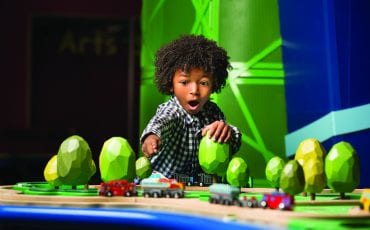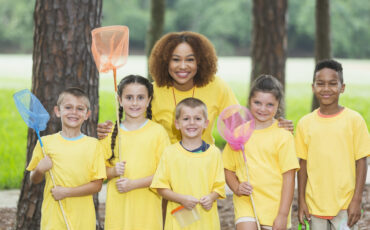Raising a Child Who Loves Reading
 It’s never too early to start reading to baby! Reading helps with eyesight and brain development; as kids grow older, reading teaches toddlers language skills, self-expression and other skills they’ll need as they begin school. For older kids, reading helps to explore subjects of interest and inspire their imaginations. Atlanta Parent asked Marcia Divack, Branch Group Administrator for Youth Services at Fulton County Library System, for her advice on helping parents get their kids started on the path to a lifelong love of reading.
It’s never too early to start reading to baby! Reading helps with eyesight and brain development; as kids grow older, reading teaches toddlers language skills, self-expression and other skills they’ll need as they begin school. For older kids, reading helps to explore subjects of interest and inspire their imaginations. Atlanta Parent asked Marcia Divack, Branch Group Administrator for Youth Services at Fulton County Library System, for her advice on helping parents get their kids started on the path to a lifelong love of reading.
How can babies and young children benefit from being read to by their caregiver? Reading to babies and young children exposes them to a greater number and variety of words. While talking to babies and children also helps build language skills, reading aloud to them gives them even more of a boost.
How can parents make reading with kids more enjoyable? Parents should set aside a time every day for reading and pick a comfortable spot with few distractions. This is a time for snuggling and bonding as well as reading. Parents should also engage children by asking openended questions about the text of the book.
What are some suggestions for parents for establishing a regular reading routine? The best time is at bedtime, when everyone is settling down for the day. It gives children and parents something to look forward to each day.
What types of books are best for babies and toddlers? Picture books with bright colors, especially good contrasting colors. Books at this age should not be text heavy and should have a good rhythm or a rhyming pattern.
Destination Storytime
Check out all the places around Atlanta that offer story times for babies and toddlers.
Metro Atlanta Libraries. Make a trip to the library! Metro Atlanta libraries offer more than just books — they’re a wealth of resources for parents and kids. Check the event calendar at your local branch to find storytime events for babies and toddlers; many also incorporate singing, crafts and other fun activities. Find your local library at georgialibraries.org.
Atlanta Botanical Garden. On Wednesdays through October, kids ages 1-4 can listen to stories about bees, flowers and other garden friends. Atlanta. atlantabg.org
Atlanta History Center. Toddler Storytime for ages 1-5 is held the first Wednesday of each month, and includes themed storytelling, songs, crafts and other activities. Atlanta. atlantahistorycenter.org
Barnes & Noble Booksellers. Children’s storytime is on Wednesday mornings at Barnes & Noble’s Buckhead location on Peachtree Road, Atlanta. barnesandnoble.com
Fernbank Museum. Storytimes for ages 1-6 are held throughout the month; check the website for dates. Afterward, explore the NatureQuest play area and WildWoods forest. Atlanta. fernbankmuseum.org
Little Shop of Stories. This Decatur shop offers Storytime on Thursdays for ages 3 and younger, along with songs and play. Storytime for ages 2-6 is held each Tuesday. Decatur. littleshopofstories.com
Marietta-Cobb Museum of Art. Kids ages 1-5 will hear a story and make an art project with their caregivers. September 19, 22 and 26. Marietta. mariettacobbartmuseum.org
Southeastern Railway Museum. The Preschool Program for ages 2-4 is held the second Thursday of the month and centers around a themed vehicle of the month, with a story, songs and games. Duluth. train-museum.org
Southern Museum of Civil War and Locomotive History. During the Mommy and Me Preschool Program on Thursdays, ages 3-5 can explore a monthly theme with a story, activities and movement. Kennesaw. southernmuseum.org
Tips for Reading With Young Kids
Start early and establish a routine, such as reading after bath time.
Find a quiet, comfortable spot to read together.
Slow down. Take time to talk about the book’s pictures and characters. Make connections between books and life.
Listen to audio books in the car or while traveling.
Ask your child questions about the story and how it made them feel. Let them ask you questions.
Let your child choose the book — even if it’s “Goodnight Moon” for the hundredth time, it’s still beneficial.
Offer a variety of books in varying formats and subjects.
Make trips to the library. Model good reading habits.
Read to your child every day; even just 10 minutes will make a difference. Talking about a book you’ve just read together will enrich your child’s experience.
Read and reread books to younger children; repetition makes books predictable and lets young children develop a sense of mastery over books.
Encourage your children to read aloud and to share an interesting passage from a book, part of a newspaper article or even a joke.
Extend your child’s positive reading experiences – if your child enjoyed a book on dinosaurs, take him to a natural history museum or find another book or DVD to share.
Limit TV watching and other screen time to make more time for books. But TV programs based on books or reading-linked children’s programs may encourage reading.
Leave notes for your children, tucked in their lunch box or under their pillow or taped to their mirror.
For birthdays or other occasions, give books and magazines based on your child’s interests.
Attend story time with your children at libraries or bookstores.
Keep books in the car for reading, or for taking along when you know you’ll be sitting in a waiting room.
Help your children find books they enjoy that are tailored to their interests, even if they’re comic books.
Help older children find a series that excites them; when a child gets hooked on one book, he’ll read the next one in the series.
Set up a reading reward program; for instance, 30 minutes of reading earns 30 minutes of extra playtime.
Don’t stop reading to your child once they are old enough to read themselves; most children can read independently by fourth grade, but listening skills develop at different levels.
Make time to read yourself and let your children see you reading and enjoying a book.
Nontraditional Ideas
Not all reading takes place between the covers of a book. Take advantage of opportunities during the day and read menus, road signs, billboards and food labels.
Place magazines around the house that cover topics your child is interested in.
Hide an object your child uses every day, then create a scavenger hunt with clues the child must read before he can find the item.
Buy a brownie mix and have your child read the directions to bake brownies.
Turn your child’s writing and drawings into a homemade book he’ll want to read and share with others.







